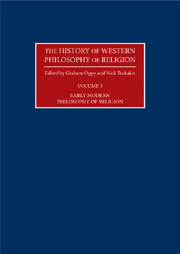Book contents
- Frontmatter
- Contents
- Editorial Introduction
- Contributors
- 1 Early Modern Philosophy of Religion: An Introduction
- 2 Niccolò Machiavelli
- 3 Martin Luther
- 4 John Calvin
- 5 Michel de Montaigne
- 6 Francisco Suárez
- 7 Thomas Hobbes
- 8 René Descartes
- 9 Ralph Cudworth
- 10 Blaise Pascal
- 11 Baruch Spinoza
- 12 John Locke
- 13 Gottfried Wilhelm Leibniz
- 14 George Berkeley
- 15 Voltaire
- 16 The Deists
- 17 Jonathan Edwards
- 18 Thomas Reid
- 19 David Hume
- 20 Denis Diderot
- 21 Immanuel Kant
- 22 Gotthold Ephraim Lessing
- 23 William Paley
- Chronology
- Bibliography
- Index
3 - Martin Luther
- Frontmatter
- Contents
- Editorial Introduction
- Contributors
- 1 Early Modern Philosophy of Religion: An Introduction
- 2 Niccolò Machiavelli
- 3 Martin Luther
- 4 John Calvin
- 5 Michel de Montaigne
- 6 Francisco Suárez
- 7 Thomas Hobbes
- 8 René Descartes
- 9 Ralph Cudworth
- 10 Blaise Pascal
- 11 Baruch Spinoza
- 12 John Locke
- 13 Gottfried Wilhelm Leibniz
- 14 George Berkeley
- 15 Voltaire
- 16 The Deists
- 17 Jonathan Edwards
- 18 Thomas Reid
- 19 David Hume
- 20 Denis Diderot
- 21 Immanuel Kant
- 22 Gotthold Ephraim Lessing
- 23 William Paley
- Chronology
- Bibliography
- Index
Summary
Martin Luther (1483–1546) was a Christian theologian through and through. For Luther, this meant focusing all theological work on God's revelation in Jesus Christ: “in the crucified Christ there is true theology and knowledge of God” (WA 1: 362,18–19; LW 31: 53). Thus one cannot expect to find in his work a philosophy of religion in a narrow sense, a general theory of God or a concept of religious consciousness that does not explicitly refer to the revelation of God in Jesus Christ. However, one will encounter in Luther's thought a highly elaborate and sophisticated self-interpretation of Christian faith that demonstrates a number of both creative and conflictive interactions between theology and philosophy. This study will focus primarily on this interface.
According to Luther's understanding, the essence of theology is interpretation of the Bible. In Luther's time, this book was viewed as the singular authoritative horizon for the construction of human self-understanding. Thus Luther's fresh interpretation of crucial aspects of Holy Scripture deeply changed the self-interpretation of many of his contemporaries, and, what is more, made world history. The Lutheran reformation originated in the university, and therefore Luther's theology developed through critical engagement with a variety of traditions: scholastic (especially Ockhamist), mystical, humanist and Augustinian. The university was the institutional setting within which theology, understood as a rational account of the Christian faith, interacted with the findings and claims of philosophy.
- Type
- Chapter
- Information
- The History of Western Philosophy of Religion , pp. 33 - 46Publisher: Acumen PublishingPrint publication year: 2009

